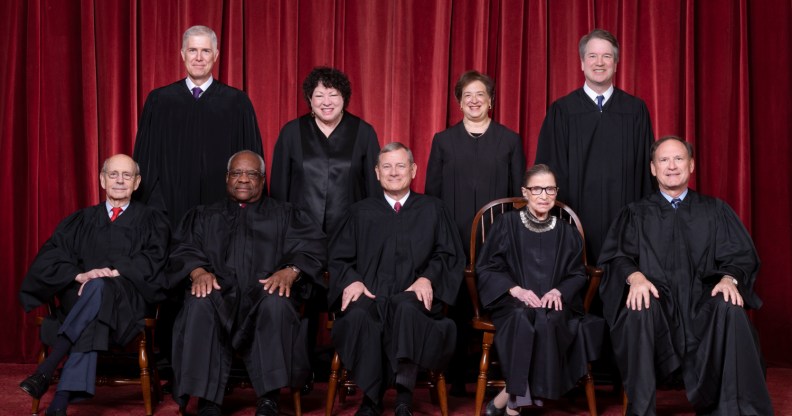US Supreme Court to decide whether it’s legal to fire people for being LGBT

The nine justices of the US Supreme Court
The US Supreme Court has confirmed it is taking up cases relating to LGBT+ employment discrimination that could have a seismic impact on LGBT+ rights.
The highest court in the US announced on Monday (April 22) that it would be taking up three cases, expected to settle the issue of whether it is legal to fire someone based on sexual orientation and gender identity.
Supreme Court case could have worrying impact on LGBT+ people
There is no explicit federal law that outlaws anti-LGBT discrimination, but lower courts have ruled that Civil Rights Act provisions barring discrimination “on the basis of sex” include gender identity and sexual orientation.
Although LGBT+ rights campaigners have previously claimed major victories at the Supreme Court, activists are fearful that the new Supreme Court case could set a damaging precedent.

The United States Supreme Court is seen on April 15, 2019 in Washington DC. (ERIC BARADAT/AFP/Getty)
Donald Trump’s appointment of two ultra-conservative justices, Neil Gorsuch and Brett Kavanaugh, has effectively overturned the previous consensus in favour of LGBT+ rights on the court.
The three cases, Zarda, Bostock, and Harris Funeral Homes, all relate to employees who were discriminated against for being LGBT+.
Employees ‘were sacked for being LGBT+’
The first revolves around Donald Zarda, a late former skydiving instructor who alleged that his old company, Altitude Express Inc, fired him because of his sexuality.
Gerald Bostock, the subject of the second case, was also allegedly fired from his job as a child welfare services coordinator when his employer found out that he is gay.
The third case concerns Aimee Stephens, who worked at Harris Funeral Homes in Michigan for seven years before getting sacked when she came out as transgender.
The Trump administration previously submitted court briefs siding with the employers in the Zarda case, insisting that federal law does not provide any protection for gay people.
Deputy Assistant Attorney General Hashim M. Mooppan told a lower court that “there is a commonsense, intuitive difference between sex and sexual orientation,” arguing that protections should not apply to gay workers,
Title VII of the Civil Rights Act, the law that prohibits sex-based discrimination, is one of the few federal laws that has been interpreted as protecting LGBT+ people.
As Republicans in Congress have long blocked efforts to pass a specific LGBT anti-discrimination measure, a ruling against Title VII would leave little federal protection for LGBT people facing discrimination at work in the 30 US states with no state-level discrimination protections.
HRC Legal Director Sarah Warbelow said: “No one should be denied a job or fired simply because of who they are or who they love, including LGBTQ people.
The growing legal consensus is that our nation’s civil rights laws do protect LGBTQ people against discrimination under sex nondiscrimination laws.
“The Supreme Court has an opportunity to clarify this area of law to ensure protections for LGBTQ people in many important areas of life.
“The impact of this decision will have very real consequences for millions of LGBTQ people across the country.
“Regardless of the eventual outcome, it’s critical that Congress pass the Equality Act to address the significant gaps in federal civil rights laws and improve protections for everyone.”
Rachel Laser, president and CEO of Americans United, said: “Much of the bias that LGBTQ people experience on a daily basis is rooted in fundamentalist views of religion. But in our richly diverse nation, our shared secular laws are what must continue to govern – without special privileges or exceptions for some religious groups.
“In order for America to live up to its promise of liberty, equality and church-state separation, we must not allow religious freedom to be weaponized to license harm to others.
“Through these cases, the Supreme Court has an opportunity to make it clear that LGBTQ Americans cannot be mistreated because their existence offends some people’s religious beliefs.
“The Supreme Court should make it abundantly clear that no one’s rights in America hinge on someone else’s religious views.”

